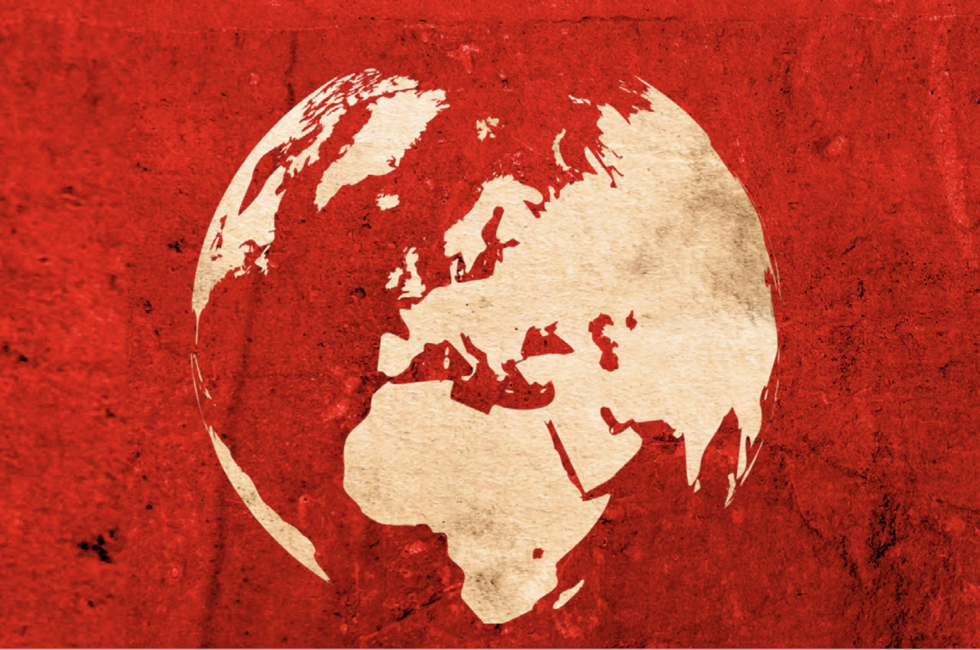Europe's Borders: A Conversation with Wolfgang Merkel and Gesine Schwan
What is the best way to counter right-wing populism in Europe? Does Europe have to close its borders and, if so, to what extent? Can we make progress in gaining acceptance for refugees by involving local government and civil society?
These were some of the topics addressed by the political scientist Gesine Schwan, chair of Germany's Social Democratic Party (SDP) Committee on Basic Values and president of the Humboldt-Viadrina Governance Platform (which she co-founded) and Wolfgang Merkel, director of the Democracy and Democratization Department at the Berlin Social Science Center, professor of Political Science at Berlin’s Humboldt University and a member of the SPD Committee on Basic Values.
Thomas Meyer conducted the interview.
Considering the many debates on the evolution of migration policy, the rise of right-wing populism and the recent futile attempts to reach agreement about it, many people are beginning to think that Europe cannot survive unless it turns itself into a fortress. Does that opinion have any merit?
Wolfgang Merkel: I think that idea is disastrous because we describe European societies as open, and rightly so. Retreating into a fortress would flatly contradict that openness. To be sure, we really are on the way towards doing so, and the explanation for that is not always xenophobia. Behind the fortress mentality there often lurks a thoroughly practical view of politics. Many citizens insist that the European Union should control its borders. That gives them a certain security. We need to have an unprejudiced debate about the extent to which we want to open or close the borders. I want to stay away from the concept of a "fortress," but stricter controls can be legitimate from both a democratic and an ethical standpoint.
Gesine Schwan: That is the way I see it, too. But the central issue is whether it is even possible for us to control the borders by closing them. If it is to be successful, control implies that people will respect the borders voluntarily, whether from the inside or the outside. When the rush to the borders of Europe came in 2015, we could not control them. The idea that external borders can be controlled by closing them completely and not allowing refugees any legal ways and procedures to enter, is unrealistic, since then it would not make sense for them to cross only at official crossing points. Refugees will find a way to get around closures. Many people do not understand that controls and voluntary respect for them go hand in hand.
But it is at least conceivable that borders could be controlled rigidly?
Schwan: One can reduce the numbers for a while, assuming one is willing to reckon with a lot of fatalities in the Mediterranean Sea and North Africa. But then people will find other, more expensive ways, which will imply still greater selection, since only those with the money will be able to cross the borders.
In my view, it is an illusion to think that we can seal off the borders hermetically. Above all, doing that would imply a degree of cynicism about our values that would have redounded upon our own social structure. One just cannot advocate values towards the outside world while simultaneously trampling them underfoot. So we have to act in accord with our values and international law and find a way to persuade even refugees that they have an interest in respecting our borders.
Merkel: It is a lovely utopia to imagine that the refugees will respect borders. It is also an illusion to believe that we will have a situation in the countries of origin anytime soon that will no longer induce refugees to come here. But I think we should do a lot more in these countries than we have done up to now. The first step would be to open up European markets to agricultural products from outside. And if, in addition, we ramp up significantly our development efforts in the countries from which refugees come, we will have greater legitimacy to control our borders better, thereby taking the wind out of the sails of the right-wing populists.
The one argument reflects an ethic of responsibility; it asks us to look at what the consequences are for our open societies. The second is an argument of legitimacy, according to which effective aid must be offered in the countries of origin rather than in the countries of destination for those who have fled.
Schwan: I would argue just the opposite. To the extent that we manage through a variety of channels to prohibit the privileging of European agricultural products and the closure of borders in Africa and to the extent that we advance genuine development via political steps, financing, and the exchange of know-how, the pressure on our borders will ease and then we can control them.
There are strong reasons to push back against right-wing radicalism. Nevertheless, we will accept large numbers of refugees in the future as well. Thus, from my perspective, it is important for us to maintain a decentralized intake of refugees in Europe and, in addition, find ways to enable citizens to participate in the relevant decisions. For me, this would be the proper way to de-legitimize the right.
It is hard to deny that there is a close connection between the previous way of making refugee policy in Europe and the rise of right-wing populism. After the elections scheduled for next year, there presumably will be far more right-wing populists in the European Parliament than ever before. Is it even still possible for Europe to manage the issue of migration politically and institutionally? And to add another question: Are the broad-gauged European trends towards neo-authoritarian systems and identity politics mainly caused by domestic policy, or are they given legitimacy by the migration and refugee situations?
Merkel: The three major themes around which right-wing populists mobilize today are, first, migration, second, anti-Islamic attitudes and third, the EU. Usually, they are linked to one another, for example through the claim that the EU does not prevent migration and that, in addition, the latter is still coming mainly from Muslim countries. Of course, I don't accept that argument, but I do think that the German government, at least, probably has made mistakes. Consider the famous statement: "Asylum knows no upper limit," which came up in almost every debate here in 2015/2016. By 2016, it was already obvious that only about 3 per cent of the new arrivals really qualified as asylum seekers under the relevant sections of the law. So the discussion was definitely on the wrong track. Germany, especially, which acted without any sort of vote, should have felt compelled to say: "We do control the borders and naturally there are upper limits." Even positivists in international law would not deny that. Nevertheless, we do want to be generous in accepting refugees, but not the ones who have come to us via the migration routes but rather the ones from camps in Lebanon, Jordan and Turkey and then in conformity with criteria of social responsibility. I say that deliberately because by this time—even in the SPD—we are having a debate about a predominantly utilitarian immigration law geared to the needs of the labour market.
We have completely forgotten the discussions of the 1970s and encouraged a brain drain from developing countries, which is actually just what we wanted to prevent, since it retards their development. We have to establish different criteria: We need generous policies on the admission of refugees, but we should also get to decide who is admitted. We would then have the moral legitimacy required to enforce our border controls and a better chance that migration would be perceived here at home as socially responsible.
Gesine Schwan, do you have the impression that a common European policy on migration is possible, one that would be accepted and desired by everybody and that would work both qualitatively and quantitatively?
Schwan: From my perspective, I would consider it to be possible if the EU (or, more concretely, the European Council, the assembly of nation-state governments) were smart and farsighted enough to do something like that. There are proposals along those lines. I don't deny that migration and refugee policies are quite crucial instruments of mobilization for right-wing politics. However, I do think that—especially in Western Europe—they are a form of scapegoating that distracts from problems that have evoked feelings of insecurity elsewhere. As I see it, those problems include great social inequalities reflected, for example, in the undermining of social security systems. And, of course, it is easy to instrumentalize something like that.
In east-central Europe, not all governments have come to power due to the migration controversy. For example, issues such as insecurity and injustice played a major role in the success of the Polish party PiS. The migration issue, of course, was added later. The situation is also different in the Czech Republic. And in East Germany, the decisive factors were broken promises made by the reunification treaty—for example, concerning pensions and safeguards for divorced women. There, insecurity and anger did set the political tone, although at first those sentiments drew on other sources besides the migration issue.
So now the question is: How do we reach a point of convergence? In my opinion, that can happen only on a voluntary basis. And the political run-up will be important. For years now, the German federal government has left Italy, Spain and Greece to deal with the refugees by themselves. Our former federal interior minister described the problem as an Italian matter. So when the right wing takes power, as in Italy, and the interior minister there, Matteo Salvini, closes the ports, that is obviously unacceptable. However, the fact that the Italians are outraged that the Germans and/or the Europeans didn’t want to take those newly arrived refugees off their hands is understandable and, by now, has been understood by the German public. Anger builds up when communication breaks down.
I believe that it might work if a kind of "coalition of the willing" could be cobbled together: e.g. consisting of Spain, Portugal, Greece, Germany, Sweden and probably also Belgium and the Netherlands. They would have to operate several European asylum control centres in which things would move very quickly following the Dutch method, where those who have been recognized as refugees voluntarily register on a contact exchange that enables them to be settled on a decentralized basis. The States guarantee that they will accept a contingent of refugees, but they allow their local governments to submit applications indicating how many refugees they want to accept and what incentives they expect to receive in the way of additional development funding.
All the parts will not mesh perfectly even under that system, but whenever such a heightened scheme of cooperation exists, national governments would be freed from the pressure of sending refugees somewhere just because they have an empty barracks available, thereby antagonizing the local residents.
Would governments in countries like Poland and Hungary allow local governments to apply and accept refugees in any significant numbers?
Schwan: At first, they might allow it if the refugees were coming only from south-eastern Europe, the Caucasus or Chechnya. They probably would permit it on a regional level, which might give rise to a movement in which mayors—and I can confirm this for Danzig and Warsaw—would say: We would like to move ahead with certain developments and for that we need certain kinds of workers. That won’t happen overnight, but there will be a change of heart. Attitudes will change at the grass-roots, and there will be new synergies in Poland, especially within the Catholic Church.
Merkel: Wouldn't that have to be financed from the centre, with EU funds?
Schwan: I am for that.
Merkel: And wouldn't it have to involve a simultaneous equalization of living conditions for all refugees, whether they found shelter in Germany or Greece?
Schwan: Yes, but on a voluntary basis in each case.
Merkel: In this context, we have the ugly word "asylum tourism." It suggests that people go to the countries that will give them the best deal, including in an economic sense. At the end of the day, why should they bother staying in Greece or even Italy, when Sweden, Germany and Austria offer better accommodations? Couldn’t the EU declare this to be a responsibility of the entire community? Of course, then they would need new tax revenues from the member countries. But it would be possible to equalize conditions, thus discouraging migrants from moving on to the best destination countries.
But doesn't that assume that greater social and economic equalization would first have to take place inside of Europe?
Schwan: No. Of course, living conditions will differ. But it also means that, if someone decided, say, to go to Portugal, local governments there likewise would declare what their costs would be, just as if they were in Germany. So, you would have different levels of funding corresponding to cost differences. Then the question becomes: Will the refugees remain in those local jurisdictions? I believe that there is a great difference between freely choosing a place to live and having it assigned to you.
Local governments would have to indicate on their websites what kind of people they need and what terms they are willing to offer. Refugees who arrive in centres of this kind would have the opportunity to decide to go where their relatives are already living and where the cultural setting suits them and where lodging, good educational opportunities and jobs are waiting. But then, it's not just material incentives that play a role in their decisions.
And they would have to pledge to stay there for a specific period of time?
Schwan: That is the next question: When is it appropriate to impose obligations and when do you rely on voluntary choices? I think that residence in a specific place for a certain period of time ought to be obligatory. But in this case, of course, we must call upon the support of local governments. In the social sciences, all this is subsumed under the heading of "factors affecting residence," such as when we enable refugees to acquire property in their new abodes. Thus, if they make the voluntary choice of a new home and from the very outset can take a look at what is being offered there, and if they are provided with a holistic integration orientation, including sports, culture, shared cuisine, etc., the likelihood of their remaining there—even for the next few years—is considerably greater.
Wolfgang Merkel, if the migration problem were to be solved in a European sense, much as Ms Schwan has just sketched out for us, would that have repercussions in those countries? Would it pull the rug out from under those far-right populist regimes?
Merkel: I don't think so. This is all a bit speculative, but I don't assume that, in Hungary or the other Visegrád countries, for example, there would be a larger-scale intake of refugees. I don't believe that shifting the level of decision-making from the central government to local governments plus the citizenry would change anything essential on this point. I suspect that the progressive, liberal societies in the West would admit many more, with a single exception: France. Here my opinion differs from yours. You won't be able to solve the problem of right-wing authoritarianism in a few countries by this approach. The issue of migration is by no means the decisive one there. In eastern Europe, newly acquired national sovereignty also plays a role. They defend it tenaciously against Brussels, and that is understandable. In my opinion, the idea that sanctions will turn those countries into liberal democratic systems again misses the point. It is more likely that they just will just be grist for the mill of the right wing.
Where do you think this trend is heading?
Merkel: There is a conflict between two distinct types of democracy in Europe. On one hand, you have open, liberal democracy tinged with cosmopolitanism, in which individual and group rights figure prominently. The Scandinavian countries as well as France and Germany illustrate this type. On the other hand, you have forms of democracy that regard the full articulation of these liberal elements and individual and groups rights as elitist and wish to strengthen popular sovereignty, the other dimension of democracy, against those liberal elites.
Of course, a modern understanding of democracy that fuses the rule of law with popular sovereignty underlies the European Union. So if this other "type of democracy" maintains itself over the long term, perhaps in the Visegrád countries, can the EU deal with that, or will it be torn apart?
Merkel: Well, at any rate, one sees the limits of the "deepening" of the EU in this case. Presumably, the EU is going to have to deal with that. There are certain boundaries and red lines. By studying the treaties on which the EU is based, one can determine whether those limits and lines already have been crossed in Poland and Hungary. There is no question whatsoever that "illiberalization" is proceeding apace in those countries and that we need to criticize it sternly. But to what extent may the EU or a group of member States dictate to the societies of the Visegrád countries what form of government they should have? We are talking about democratically elected governments here. In these matters, the EU has a mandate based on the treaties, but it does not have a democratic mandate.
Schwan: I see matters a little differently. In Poland the current governing party, the PiS, was elected by about 38 per cent of the voters. But that certainly does not mean that society as a whole, even those 38 per cent, wanted to change their system. In fact, the PiS did not campaign on a promise to make such a change. Instead, it promised higher child care subsidies for families and better social security. So when the EU criticizes the current Polish government, one cannot say that they are imposing a model of politics on that government. After all, a lot of people are fighting against the government in Poland and against the fact that the rule of law is being set aside. Relying on the advice of experts, the EU is backing up those regime critics by pointing out that the conditions that Poland had to meet in order to join the EU are still in effect. Thus, there is no question here of a surprise coup by the European Commission. There are deficiencies in States where the rule of law prevails, too. But in this instance, principles are being undermined, and it is by no means the case that the entire Polish society approves of that.
Are things coming to a head on this question in Polish society?
Schwan: Yes, they are. A number of distinct currents of opinion may be observed. There is opposition but also resignation. For example, the Catholic Church in Poland is putting some distance between itself and the very primitive way in which refugees and migrants generally are being treated, and it is expressing its disappointment in no uncertain terms. For instance, a well-known Polish priest wrote in the important Polish weekly, Tygodnik Powszechny, that the Polish government is basically de-Christianizing the country by trampling underfoot all Christian values.
So there is much more opposition in Poland than we imagine here. We have to stake our hopes on civil society. An "out" homosexual who had started a new political party suddenly found himself the mayor of the small Polish town of Słupsk. Also, much is happening in the environmental field, where there is major opposition to the truly irrational coal policy in Silesia that is being pushed by the coal companies in cahoots with the present government and will prove disastrous in the long run. Poland, like many other countries, is a dynamic place. The EU should make this known. That would lend support to the people in those societies who are fighting against the erosion of the rule of law from the inside. But the European Union will never succeed in depriving Poland of its voting rights. For that to happen, the decision would have to be unanimous, and Hungary would never go along with it.
###
Adapted for style, the text was first published by Neue Gesellschaft / Frankfuerter Hefte, Journal of Social Democracy.
About FES Connect
Connecting people, in the spirit of social democracy, we source and share content in English from the German and international network of the Friedrich-Ebert-Stiftung.




